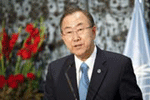A life of dignity for all
Published on Thu, 2013-08-22 13:37
"A life of dignity for all" should be the common goal of world governments, says Ban Ki-moon, Secretary General of the United Nations in the report sent on Friday August 16 to the General Assembly of the UN. The sixty agencies and programs of the UN dealing with development currently guide their actions by the Millennium Development Goals proposed and imposed at the beginning of the century by donors, without the member states having had a chance to discuss them. The MDGs "expire" in 2015 and their replacement by a new development agenda is being hotly debated by the international community, including now also civil society organizations, philanthropic foundations, corporations and even the Internet-based social media. In his report, Ban proposes as overarching objectives "Poverty eradication, inclusive growth targeting inequality, protecting and managing the natural resource base of our planet within a rights-based framework and cognizant of the nexus between peace and development ". This requires "economic shifts to sustainable patterns of production and consumption, effective governance and a renewed global partnership and means of implementation." The Secretary General proposes more than a simple upgrade and postponement in time of the current MDGs, as many expected, but introduces new features: First, human rights are not just mentioned in the preamble but the whole framework should be “rights-based”. Human rights are not understood only as civil and political rights, but they are defined as a substantial part of human dignity: "No person should go hungry, lack shelter or clean water and sanitation, face social and economic exclusion or live without access to basic health services and education. These are human rights, and form the foundations for a decent life." Consistent with this concept, poverty is no longer defined only by an income level of less than one dollar a day, as proposed by the World Bank, but must be addressed in their "many manifestations" including "iscrimination, insecurity, inequality and environmental and disaster risks." Ban Ki-moon aligns with developing countries in their view that the responsibility for addressing climate change must be differentiated, which means that higher costs must be borne by the industrialized countries, which caused the problem. The Secretary-General notes that development aid has fallen in the past two years and demands from advanced economies that they meet the old pledge of targeting 0.7% of their income to international cooperation. On the other hand, secretary general Ban supports the proposal of the desire of the donor countries, backed by the IMF and the World Bank, to use official development assistance for “leveraging other funding." This could mean a risk reduction mechanism for mega-projects, with guarantees provided by public aid funds. Large corporations will reap the profits if the enterprise is successful, and socialize the losses if things go wrong. The great absentee in the report is the financial and economic crisis, only mentioned once in the report, in the context of the decline of aid. The report ignores the dire consequences of the crisis and the resulting financial volatility on developing countries and the devastating social impacts of the austerity plans in the North and South, which have been well documented for example by UNICEF, the United Nations fund for children. By way of silence, the Secretary General seems to accept the predominance in those issues of the G20 and the International Monetary Fund. Neither does the report mention the many calls for reform of the IMF and the World Bank coming out of the very UN General Assembly to which the report is addressed. The heads of State and government of the world will begin to discuss these proposals in New York in September. No decisions are expected before at least one more year of debates. The 14 things governments should do, according to Ban Ki-moon
A comment by Roberto Bissio. |
SUSCRIBE TO OUR NEWSLETTER



